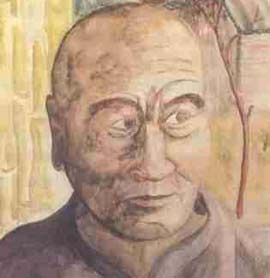Dopamine D3 agonist helps to regenerate nerve and restore the function of Parkinson's brain patients
Parkinson's disease, also called paralysis, is a central nervous system degenerative disease caused by the loss of dopamine neurons or dopamine neurons. The disease usually occurs in the elderly and manifested by symptoms of increased muscle tone (muscle stiffness), tremor, uncontrollable limbs, slow movement, difficulty walking, loss of private reflexes so .
The presence of endogenous stem cells and endogenous progenitor cells in the central nervous system of mammals and adults has given birth to innate resilience. of the brain as well as the ability to treat diseases caused by degeneration in the nervous system like Parkinson's disease. However, which agent or signal triggers the synthesis mechanism to restore brain degeneration from stem cells and the original cells available in this brain?
The idea of using endogenous original cells to replace nerve cells lost by brain degeneration has been around for several years but requires finding agents that can stimulate the Growth and differentiation of these cells. The original cell is a type of stem cell but limited to the number of reprints, they will quickly multiply, differentiate, and bind to the corresponding tissue. The hope of treating Parkinson's disease with endogenous original cells is now strengthened by the study of Van Kampen and Eckman, the US University of Mayo Clinic, published in the Journal of Neuroscience (The Journal of Neuroscience, volume 26, no. 27 pages 7272–7280, July 2006). Research on this model of Parkinson's disease demonstrates receptor activation
 dopamine will stimulate new neuronal formation from endogenous native cells available in the brain and these new neurons will play a role in repairing damaged nerve function.
dopamine will stimulate new neuronal formation from endogenous native cells available in the brain and these new neurons will play a role in repairing damaged nerve function.
In Parkinson's patients, the mid-black neurotransmitter (substantia nigra pars compacta SNc) in the middle of the brain with the striatum is impaired due to a deficiency of dopamine-producing neurons . This pathway is one of four dopamine pathways in the brain and it plays an important role in the control of movement. The current treatment for Parkinson's disease is to increase the level of dopamine. However, this treatment has many side effects, reducing the response of the drug according to the duration of treatment, as well as having no effect on the root cause of the disease. Using endogenous original cells to replace dopamine-producing neurons has many advantages over transplantation techniques. The advantage is that these endogenous intact cells are available in black SNc and previous studies have shown that activating dopamine D3 receptors will stimulate the neurotransmitter development of the black zone in healthy mice. .
By using 6-hydroxydopamine to cause Parkinson's disease in mice, 7-OH-DPAT, a agonist on dopamine D3 receptors, has been shown to stimulate the production of dopamine-producing neurons from the cells. Endogenous original cells. With cell marker DNA synthesis techniques, the researchers showed that long-term treatment with dopamine D3 agonists increased growth in black. These newborn neurons then synthesize proteins as mature dopamine-producing neurons. If these new dopamine neurons are able to repair and repair function in the black line - striatum, these neurons must form new pathways from the black substance towards the striatum . This process is monitored by injecting fluorescent markers into the striatum. Observation after the reverse shift of fluorescent markers into the black body showed an increase in newborn neurons along the axonal pathway. Finally, mice treated with dopamine agonists were given two behavioral tests and demonstrated a motor function recovery. This new result provides evidence of a fundamental change in neurotransmitters after several months of treatment.
This new finding suggests that endogenous primordial cells can contribute to the repair of the function of damaged nerve bundles and also provide a new hope not only for Parkinson's patients but also for patients with other neurological impairments. Although there are several dopamine D3 receptor agonists used in the treatment of Parkinson's disease, this study sheds some light on the role of the drug in stimulating endogenous primordial cells while encouraging. The researchers found drugs that had similar effects but had fewer side effects. This study also helps to better understand neurotransmission at the molecular level to find new therapies for Parkinson's disease.
Thai Khac Minh
- Miracle: Dead 4-hour pig brain is revived
- Sleep helps reduce symptoms of Parkinson's disease
- Detecting protein can reverse Alzheimer's symptoms
- The prospect of treating Parkinson's by gene therapy
- Restore brain activity by reducing pain
- Artificial brain helps restore mobility
- Finding the gene helps rejuvenate the brain
- Memory recovery by electric shock
- T-PA can regenerate dying organs
- Sex helps the brain grow faster
- Memory of the digestive system helps us remember where we used to eat
- Hair follicle germ cells help to recover nerve damage
 Green tea cleans teeth better than mouthwash?
Green tea cleans teeth better than mouthwash? Death kiss: This is why you should not let anyone kiss your baby's lips
Death kiss: This is why you should not let anyone kiss your baby's lips What is salmonellosis?
What is salmonellosis? Caution should be exercised when using aloe vera through eating and drinking
Caution should be exercised when using aloe vera through eating and drinking